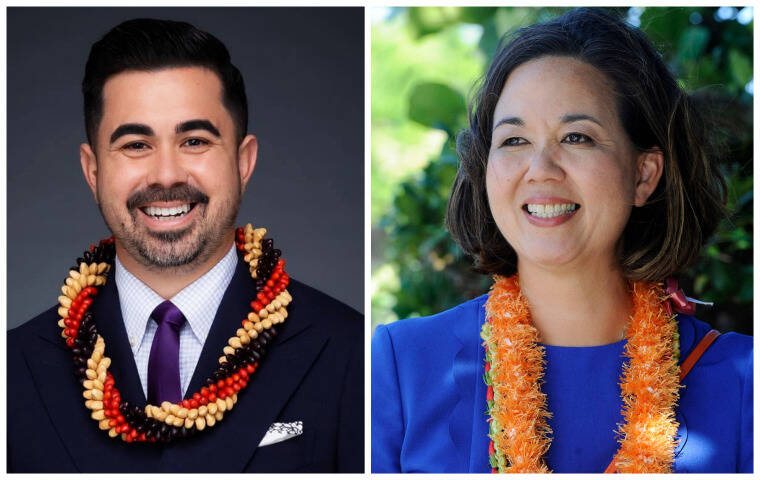Hawaii’s two top candidates seeking to replace U.S. Rep. Kai Kahele in Congress accused each other Wednesday of spreading falsehoods in their competitive effort to get elected.
Former state Sen. Jill Tokuda and current state Rep. Patrick Branco, both Democrats and Windward Oahu residents, aired grievances at one another over political action committee advertising and campaign donor contributions during the Honolulu Star-Advertiser’s “Spotlight Hawaii” Opens in a new tab online video livestream program.
The virtual face-to-face criticism, a little more than a week ahead of the Aug. 13 primary election, partly delved into a claim promoted by Branco that the National Rifle Association “endorsed” Tokuda in 2012 as an unopposed incumbent seeking reelection in the state Senate.
Branco’s campaign website lists this NRA election preference along with a “B” grade the organization assigned Tokuda in 2010, 2012 and 2014 as evidence of “Tokuda’s troubling background on gun safety.”
VoteVets, an Oregon-based PAC, has run a commercial disparaging Tokuda over the NRA material promoted by Branco. Tokuda has called the ad, which features images from a recent school shooting in Uvalde, Texas, “disgusting” and on Wednesday said mainland PACs have spent over $1 million supporting Branco’s campaign.
Branco fired back, calling Tokuda’s criticism of PACs supporting his campaign a “baseless distraction” and said that she has done an effective job pushing “falsehoods” to news media.
Coordination between a political campaign and PAC advertising is illegal, and Branco said he has done no such thing.
”I’ve said time and time again, I have not, do not and will not coordinate with any outside entity,” he said. “I do not believe that any outside group should be able to influence our elections. I have never asked for any group to buy ads to try to influence this election.”
Colin Moore, director of the University of Hawaii’s Public Policy Center, previously described Branco’s online promotion of the NRA material against Tokuda as a form of “red boxing” that suggests areas of advertising for supporters that are barred from coordinating with election campaigns.
This practice, new to Hawaii politics, derives its name from some mainland politicians suggesting negative talking points against opponents in a red box on their websites.
Branco claims that the NRA material against Tokuda, along with positive attributes about himself and definitions of a few common Hawaiian words on his website, including one used in the VoteVets ad — keiki, are on a “media center” page created for journalists outside Hawaii.
Tokuda described the material as a “road map” for dark money mainland interests to support her biggest opponent and put her down.
“It’s a for-sale sign, the way I see it, that this congressional district goes to the highest bidder,” she said on “Spotlight.”
In a retort, Branco said the PAC representing veterans, and another one supporting him representing Hispanics, reflect a portion of Hawaii’s population and deserve to advocate for who they want in office.
The squabbling during the livestream started when each candidate was allowed to ask the other a question.
Tokuda led with whether Branco was running to represent the people of the 2nd Congressional District, which covers mainly rural Oahu and the neighbor islands, or mainland special interests spending money to support his campaign.
When it was Branco’s turn, he prefaced his question to relay that his grandfather always told him to show aloha amid disagreement and difficult issues, and then asked Tokuda if she would put one issue behind them by calling on the NRA to release any and all questionnaires submitted to the organization “so that voters can know exactly what you have said to them?”
Tokuda called Branco’s question an affront to the notion of aloha, and said she was a supporter of strong gun restrictions during her 12 years in the state Senate.
“I don’t know how the NRA does its ratings,” she said. “I have never wooed and asked for their support, nor have I ever supported the NRA.”
Many Democratic Hawaii lawmakers received “A” or “B” grades in the NRA data cited by Branco, including a “B” grade in 2012 for then-Sen. David Ige, who has been governor the past eight years.
Branco called Tokuda’s criticism of the VoteVets ad, as well as CHC Bold PAC that has spent money supporting Branco, an attempt to vilify a veterans advocacy organization and Hispanic members of Congress to push a false narrative that mainland groups are trying to buy an election.
Branco alleged that Tokuda is the only one actively soliciting mainland money, and claimed that she has made multiple trips to the mainland to “hobnob” with CEOs and lobbyists at $1,000-a-plate dinners while he has remained in Hawaii during the election campaign.
“This is soliciting mainland money to influence this election, and I will not sit by and let my opponent lie about actions or character,” he said.
Branco also said the total amount of campaign donations he has raised — about $150,000 — is only a little more than what Tokuda has raised from mainland donors.
Tokuda, who has raised about $528,000, shot back that 85% of her campaign contributions have been from Hawaii as opposed to over 50% for Branco.
“That’s a big difference,” she said. “So when you talk about who are we courting, let’s be real about the facts.”





 Stay updated on Hawaii and national elections coverage
Stay updated on Hawaii and national elections coverage